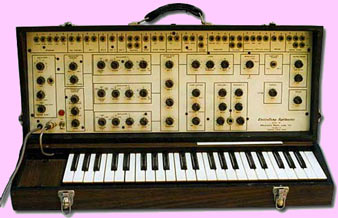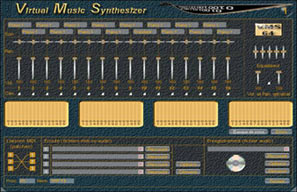THE SYNTHESIZER
GRADUATES
"What's this whole world comin'
to?
Things just ain't the same
Anytime the hunter
Gets captured by the game"
-The
Marvelettes
1967
|

|

|
At the turn of the 19th century, the
horse and carriage, as major transit vehicle, was supplanted by Henry
Ford's motorcar. Now, after the turn of the 20th century, the
performing musician, in much the same way, has been marginalized as a
major player on the stages of live theater and in the studios of
cinema production houses by the use of music synthesizers and the
newest generation of music synthesizer and the sampling mentality...
the virtual orchestra.
Electronic music synthesizers
have been in existence over 90 years, ever since Lev Sergeevich Termeng created
the theremin, an instrument which produced eerie sounds and mainly
was used in science-fiction movie soundtracks and avant-garde music
ensembles. (indeed, the pipe organ of J.S. Bach's era can be argued
to have been the first natural synthesizer, with stops that
mimicked the instruments of the time and even the human voice) Like
so many musical inventors, Lev Termen never intended that his
instrument would become a modern orchestral staple, in fact, his invention was, at first, commisioned by the Russian miltary as a proximity locator, but by the 1970s,
popular music was not popular unless an electronic sound synthesizer
was somewhere in the mix.
The purists railed. Even I, who, in
1973, purchased my first electronic synthesizer (for $1,300.00 and
that was everything I had, back then), an Electronic Music
Laboratories - EML 101 - (yes, I still have it!) was skeptically
elitist at the instrument's almost self-insistence upon sounding like
traditional, orchestral, acoustic instruments. In fact, synthesizers
still are years, maybe decades away from fooling all of the people
all of the time, even when played by the most able and sensitive
musicians. I still believe that digital can only and ever approximate
analog. While digital and wireless may be as cool as one can get,
analog and wired is as real as one can get. Technology, however, has
closed the gap to the point where, "...only your hairdresser knows
for sure!"
So we're all caught in the vortex.
Musicians who have incorporated musical electronics for every
righteous or self-serving reason, from economic necessity to
pioneering spirit, revel in the easy way to become multi-talented. We
too, have abdicated our old-school scholarship by succumbing to the
production value, "...is it live or is it Memorex?" Rather
than to convince people of our art or to draw people to our art,
through practice and presentation, we settle for technical trickery.
Virtual reality is no longer an oxymoron. Hmm, that's pretty
ugly.
Deep down, that is what concerns serious
musicians most. Not our systematic loss of jobs and station, not our
continuing battles with producers and publishing houses, not even our
dwindling musicianship but rather, our listeners' apathetic
disconnect. Through technology and mass production, our audiences
have been de-sophisticated and de-sensitized to the point where they
can neither hear nor feel the differences anymore. Even worse, with
the economic promise of, "more for less", the cheaper grade is more
often sought. That hurts most deeply because basically, a faithful
artist wants ultimately to reach someone.
It is in our hands to maintain the
highest levels of honor and artistry. Also, it is our responsibility
to be the caretakers of our own heritage. It may be all of our human
ability to whisper, to speak, to shout and then, to scream. When,
however, the plug comes out, then we'll find out who still can
sing.
"Many are called but few are
chosen..."
and unfortunately,
many of the chosen never should have been called.
Comlaints without suggestions? That's
not how I work!
There are two immediate, short term
answers:
1. As performers, demand, work for and
effect sensible polices which maximize the inclusion of live
musicians in all arenas where live performances occur. By "sensible",
I also mean that we do not kowtow to usurious practices on either
side of the ledger, those ranging from union lockouts to invisible
payments to non appearing musicians. Further, and perhaps a little
easier, now that we musicians actually produce much of our work
outside of once strangling contracts, ensure that record companies
(as well as ourselves) continue to pay fair residuals to every
project musician, regardless of production station, as long as sales
or syndication remains viable.
2. As musicians, maintain a depth of
scholarship and practice so as not to be excluded from so many
professional musical levels due to expediency or to lack of
knowledge. In such a way we can mold our working environment, hone
our preferences and continually provide for our performance
networking community. In such a way, we can surround ourselves with
people we trust to do supporting and structural work, which we either
are loathe or incompetent to perform. In such a way, we can continue
to inform, educate and entertain our audiences, which once looked to
us for excellence but now settle for or even seek entertainment by
bombardment.
"Problems cannot be
solved
at the same level of
awareness
that created them."
Richard A Cummings
An American In Thought
R.A. Cummings (2005)
Copyright © IMARA Music
return



